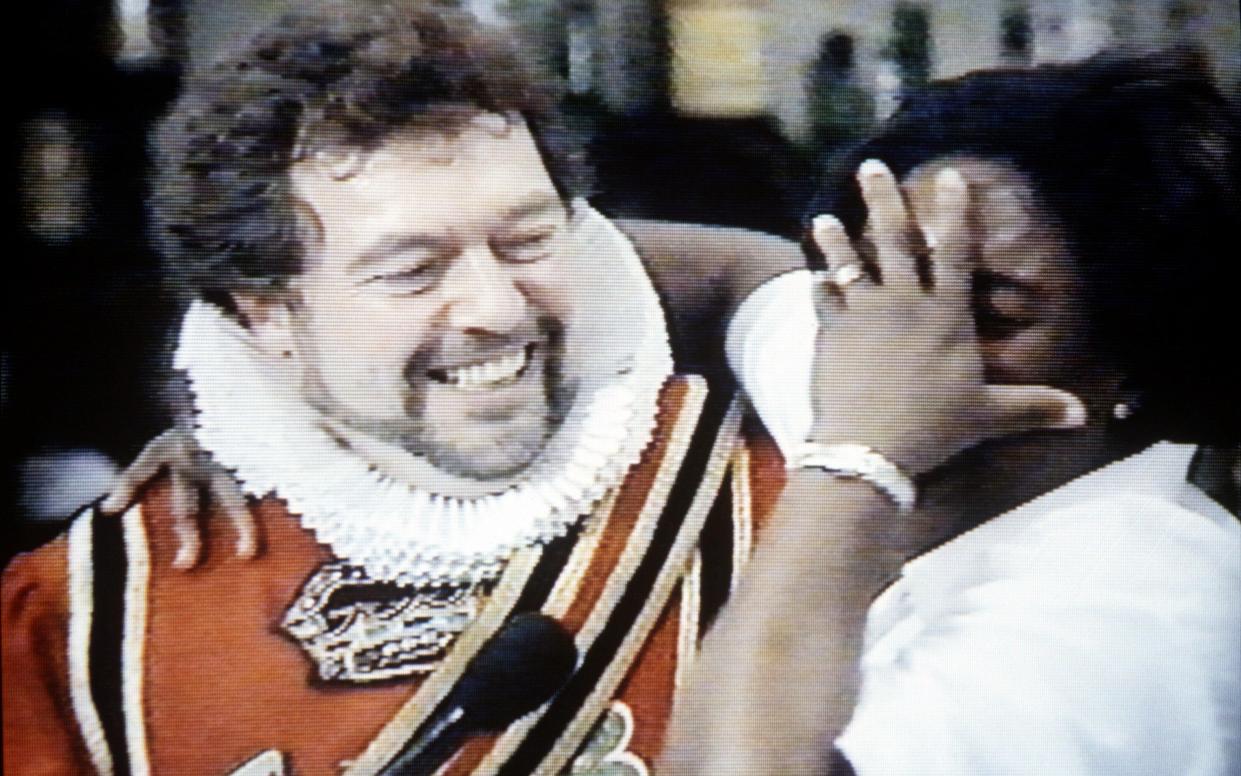The internet pranksters going to extreme lengths to find fame

For those who are tasked with making sure events aren’t derailed by uninvited guests, it has not been a vintage week. On Tuesday, DJ Greg James found himself in an awkward spot when a mysterious caller rang up his Radio 1 show and played a tape of a woman making sex noises down the phone.
And then, of course, there was the Baftas, which saw its own bit of unplanned drama when YouTube prankster Lizwani snuck up on stage alongside Oppenheimer’s producer Emma Thomas, director Christopher Nolan and star Cillian Murphy when their movie won Best Film.
The Bafta invasion was far more audacious than the BBC radio one, but in actual fact, most people missed it entirely. Lizwani didn’t do or say anything, and quietly left the stage with the others once Thomas had finished her acceptance speech – at which point security hauled him off. Nor did he bother any of the A-list audience, which included the Prince of Wales.
But it’s the latest in a long line of gate-crashing stunts by YouTube and TikTok prankster Lizwani, who has previously snuck into the Brit Awards, the Fifa Balon d’Or football awards and the Reading Festival.
Of course, pranks come in all shapes and sizes, from classics like whoopee cushions and the bucket of water suspended over a door to drunken students wedging traffic cones on statues, or the annual tradition of April Fools’ jokes.
But have public pranks become increasingly disruptive – even dangerous?
Inserting yourself into an awards ceremony, and potentially ruining the high point of someone’s career, certainly speaks to this narcissistic social media age: so what if it ruins a well-earned moment for someone else if it gets you more hits?
That feels very different to the comparatively benign pranks of the 1980s, as embodied by presenter Jeremy Beadle. His popular ITV programme Beadle’s About was beloved for the tricks he played on unsuspecting members of the public, like convincing them their car had been crushed, or that aliens had landed in their garden. The stunts usually ended in mutual hilarity – and no real harm done. (Only once did an irate man give Beadle a thumping.)

Fast-forward to 2000 and the American TV show Jackass, and that alien ruse looks downright cuddly. Cast members like Johnny Knoxville, Bam Margera and Steve-O regularly put themselves – and the viewers who rushed to copy them, despite “don’t try this at home” warnings – in serious peril. Margera let an actual live alligator loose in his parents’ house, and, perhaps deservedly, he was trapped in a pit with his worst fear: snakes. Knoxville was tricked into rubbing horse semen into his face for months (he thought it was sun cream); bodily fluids were a puerile recurring trope.
The Jackass cast became stars thanks to their violent, gross-out, cruel stunts. But opinion is now divided on this frat-boy style of pranking. Many condemn it – and yet, thanks to an increasingly fractured viewership, plus social-media platforms egging people on, today’s pranksters are going to ever-more extreme lengths to get attention.
Last year, TikTok star Mizzy was jailed for 18 weeks after breaching a court order when he shared videos of strangers without their consent. He had previously invaded someone’s home, abducted a pensioner’s dog, knocked people off their bikes and ripped up library books.
Most recently, in January this year, a coroner ruled that 13-year-old Christopher Kapessa had died after a friend pushed him into a river in South Wales in a “dangerous prank”.
There’s no doubt that this trend has gotten out of hand. But with the likes of TikTok offering the lure of fame and fortune, pranks are more popular than ever.
Jarvo69, as the name suggests, is obsessed with sex, and he’s managed to get his juvenile sex noises into some high-profile events and broadcasts. Last month, he pranked the Bowls Championship, while previous victims have included the Euro 2024 draw and an episode of Match of the Day. The latter, in fairness, got a good chuckle from Gary Lineker.
Similarly, Trollstation is a hub for British pranksters who think big – and sometimes political. Their disruptive escapades have ranged from invading the pitch for a UEFA Europa League game to pretending to pull an art heist at the National Portrait Gallery. The latter caused a panicked stampede, leading to injuries and three arrests of the pranksters involved. Trollstation also staged an ugly confrontation on a Southend-on-Sea beach involving a Muslim woman wearing a burkini, commenting on France’s burkini ban, and, most recently, they projected the Palestinian flag onto Big Ben.
Pranking might have an anti-establishment vibe, but Archie Manners is, unusually, a proud public-school prankster – he’s even a mate of Prince Harry’s. Manners runs a YouTube channel with Josh Pieters, and they’ve duped well-known figures such as Katie Hopkins and Piers Corbyn. The pair have also waded into activism (or more accurately anti-activism) by infiltrating and disrupting Just Stop Oil events – essentially giving the controversial protest group a taste of their own medicine. Last year, they disturbed the group’s Beyond F—ed Banquet by setting off 150-decibel rape alarms hidden in helium balloons.
As modern pranksters keep trying to one-up each other with increasingly massive and dangerous pranks, inevitably some are getting into trouble – even risking their lives. Serves them right, you may think; certainly, some seem to be using the “prankster” moniker as an excuse for pretty vile antisocial behaviour.
Tanner Cook, who runs the Classified Goons YouTube account with his friends, got a nasty surprise when he tried to prank (or, perhaps more accurately, harass), a stranger in a north Virginia mall food court. As Cook got into Alan Colie’s face, holding up his phone which repeatedly played the message “Hey dips–t, quit thinking about my twinkle,” Colie responded by pulling out a gun and shooting him in the chest.
Cook survived, and a jury subsequently found Colie not guilty on the charge of aggravated malicious wounding, accepting that he was acting in self-defence.
Cook has continued to make videos – which include following strangers through department stores and pretending to vomit in Uber vehicles – and no wonder when they reportedly net him $2,000-3,000 a month.
Another controversial prankster is Brit Sam Pepper. The former Big Brother contestant first caused controversy in 2014 with his “Fake Hand Ass Pinch Prank”, in which he would approach women and ask for directions, then pinch their bottoms. Several people later accused him of sexual harassment.
Worse was to come. In 2015 he kidnapped a fellow YouTuber in 2015 and made him watch as someone apparently murdered his best friend. Metro compared this prank to an ISIS-style execution, and more than 100,000 people signed a petition demanding that Pepper be removed from YouTube.
Pepper later rebranded, switching from pranks to vlogs and stunts, and from YouTube to TikTok, where he now has 4.6 million followers. But he hasn’t entirely lost that mean-spiritedness. Recent videos include one where he creepily tries to pick up a girl in a supermarket, and another where he scares strangers by concealing a fake spider in his hand.
It’s easy enough to condemn this as the moronic behaviour of a little boy who never grew up (and yes, the majority of these pranksters are male). But, unlike with the Jackass franchise, it’s not something that others can choose to avoid. Those innocent visitors caught up in the National Portrait Gallery stampede didn’t ask to be in a prankster horror movie.
However, as long as enough people watch these videos (dismayingly, Pepper’s spider hand is up to 26 million views) – and as long as social media platforms prioritise and monetise such engagement – pranks will just keep getting more public and more outrageous, no matter the consequences for the rest of us. And there’s nothing funny about that.


